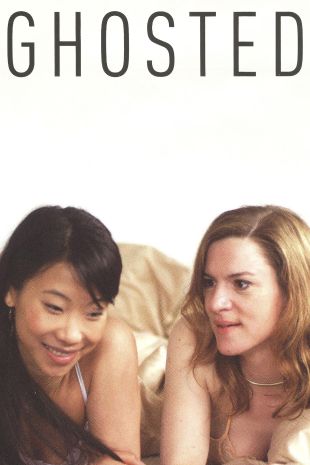
The central character of Ghosted, Sophie Schmitt (Inga Busch), is a lesbian conceptual artist and filmmaker in her late thirties or early forties, still reeling from the tragic loss of her young Taiwanese lover, Ai-ling (Ke Huan-Ru). For the first two-thirds of the film, neither Sophie nor the audience is certain of the exact circumstances that led up to the young woman's death, leaving it open-ended, elliptical. Sophie hosts a video installation tribute to Ai-ling, and at the tribute she spots another young Asian woman in the audience, reporter Wang Mei-li (Hu Ting-Ting), who unnerves Sophie on some level, with her transfixed stares and unflinching insistence on doing an interview with Sophie for the Taipei News. In time, Sophie begins to suspect that Mei-li may not be everything that she claims to be, and that she might have some strange connection to Ai-ling's death, especially after Mei-li begins systematically visiting the couple's old acquaintances without Sophie's knowledge.

Co-writer/director Monika Treut frees up the narrative on a temporal level by actually commencing with Ai-ling's story, flashing forward in time to Sophie at a later point (following Ai-ling's death), and then periodically flashing back to Ai-ling during her initial encounters with Sophie, the couple's love affair, and the tragic end of the relationship. That nonlinearity represents an ingenious choice, because it enables the co-writer/director to establish the idea that love -- not passing infatuation or lust, but deep emotional commitment to another human being -- endures in a kind of mnemonic continuum; everything flows together, and it can often transcend the death of one partner. On that level, the picture succeeds. The very best that can be said of Treut is a high compliment indeed: working in tandem with actors Busch and Ke and co-scripter Astrid Ströher, she convincingly establishes the many dimensions and layers of the love between Ai-ling and Sophie -- though it contains only one sex scene, the film grows as sensual and erotic as it is emotionally persuasive. Another particularly mature and refreshing facet of the film, as well, is the fact that Treut builds audience enthusiasm for her lovers on the basis of their mutual confidence and self-assurance, presenting female characters who have long ago embraced their own sexual identities. This frees her up to explore the nuances and gradations of the relationship itself, on emotional and physical levels.
For all of its strengths, though, the picture disappoints on one key level. At its core, this is a resolutely simple and uncluttered story about a romantic relationship involving two women, and the grief wrought when one dies, leaving the survivor bereft and memory-sodden. The addition of Mei-li works in the sense that it enables Treut to communicate the profound idea of the remaining partner seeing echoes of the deceased in successive lovers (and on some level, looking for traces in these individuals), but the picture misfires when it begins to add a supernatural layer involving Mei-li's origins, because the metaphysical elements, in addition to being hopelessly muddled on a narrative level, do nothing to enrich the central themes of the piece. All of the spiritual elements feel tacked on, excessive, gimmicky.
Luckily, these are not fatal missteps, and the drama offers much to compensate, including a subtle sense of visual splendor and competent, credible performances from the three leads.
